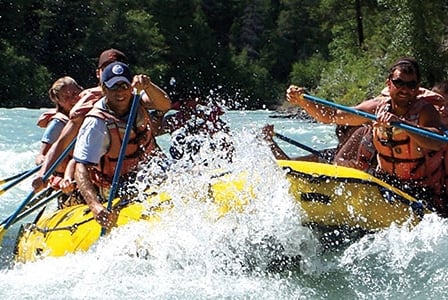
Celebrate Family Fun Month by enjoying the wonders of nature together–at a park, in the forest, or in your own backyard.
Families that create fun traditions have something to get excited about and to look forward to all year. As summer draws to a close, it’s not too late to start some summer traditions today. After all, August is Family Fun Month—the perfect reason to celebrate family time!
Family traditions make a difference
“Families that have fun together create a strong sense of belonging,” says Robert Nickell, a parenting columnist. “It gives each family member the feeling that this is my family … and we love each other.”
“Bored families are stressed and unhealthy because they aren’t out having fun,” says Kristen Brown, a holistic health coach. “Build in time for adventures. It means busting out of your daily schedule to do new things that make you happy and bring you closer.”
Canada’s great outdoors—in its prime weather during August—is the best place to start!
Park parties
A day at a park may seem simple, but don’t underestimate this option. “City living involves an extraordinary disengagement of humans from the natural environment that is likely to be detrimental to health and well-being,” according to a report for Deakin University and Parks Victoria. The report goes on to call parks “a fundamental health resource,” noting how research shows that spending time in a park can help when it comes to stress, anxiety, cardiovascular health, and more.
“A playground becomes an incredible workout for children and a great opportunity to have them use their imagination,” says John Rowley, a certified personal trainer. Try these easy park play day ideas.
Pack a picnic
Let children help with groceries and food prep to teach them the fundamentals of healthy eating.
Turn fitness into a game
“Make it fun as a family: go to the park with a soccer ball and just kick it around to get everyone moving,” suggests Rowley. “Just letting children play and have parents try to keep up will be a very demanding workout!” Other activities include touch football and tag.
Go stargazing
If you’re far away enough from bright city lights, enjoy August’s warm evenings and visit a park at dusk to watch the stars come out. Count shooting stars or bring stargazing books and see who can find the most constellations.
Forest frenzies
Modern technology offers benefits, but also drawbacks. “[For] families, the abundance of choices, including video games and social media, have allowed adults and children to split apart and engage in separate parallel activities far too often,” says licensed family therapist Allen Wagner. “This often leads to a disconnect in communication [and] common interests, resulting in reduced time spent with one another.”
Head to the forests and leave technology behind. “When people are present with another—sorry, no phones!—they really get to know one another in a different way,” says Wagner.
This time in the forest could do our hearts and minds a lot of good. A study in the Environmental Science & Technology Journal found that while any exercise done in nature improves self-esteem and mood, doing so near water increases these benefits, and young people benefited from exercising in nature the most. Additional research has found that spending time in nature may lower blood pressure, reduce stress, strengthen our immune system, and improve our focus, including among children with attention deficit hyperactivity disorder (ADHD).
To find convenient summer camping and hiking options, visit Parks Canada online at pc.gc.ca. While camping or hiking, try activities the whole family will love:
- Make a scavenger hunt. Write a list of unique forest items (such as a pine cone, a red flower, or a heart-shaped rock) and see who in your family can find the most items within a certain area within a specified time limit.
- Go birdwatching. Birdwatching groups in your city often offer printed guides to your region’s feathery friends. Or, visit Audubon International at birds.audubon.org or Bird Studies Canada at bsc-eoc .org/volunteer for online guides and local birdwatching and bird-counting volunteer programs.
- Instead of snapping selfies with a smartphone, go low-tech. Everyone packs a notebook and their favourite art tools, such as coloured pencils. Your family can document their favourite sights in a memorable way.
Backyard bonanzas
A report by the National Wildlife Federation estimates that while 75 percent of today’s adults spent much of their childhood outdoors, only 25 percent of today’s children do the same.
This has big ramifications. For example, playing outdoors can boost a child’s vitamin D levels—an article published in Pediatrics, the journal of the American Academy of Pediatrics, warns that millions of kids may have suboptimal levels of this important nutrient—while the American Academy of Optometry notes that children who play outdoors have better vision than those who spend more time indoors.
Take a cue from a study that found gardening may reduce symptoms of depression and build a family garden. You don’t need a lot of room. Cherry tomatoes, lettuce, and herbs grow well in small beds and containers. This teaches your kids about biology and ecological stewardship.
Other backyard summer activities to try
- Host a car wash for charity. It inspires an entrepreneurial spirit in children, and you may even get to know your neighbours for a bigger sense of community.
- Hang a sheet on the side of your house and use a projector to turn your backyard into an outdoor theatre. Health food stores offer organic popcorn choices for a nutritious theatre snack.
- Go on a bicycle parade. Everyone decorates his or her own bike. Spend the afternoon riding around the neighbourhood as a family.
- Unleash your family’s inner Monet and draw a sidewalk chalk mural on your driveway. Or turn it into a calorie-burning game with hopscotch and other chalk activities.
Be intentional
Let this be the start of a year-long series of excursions and creative family time that draws your family closer through laughter. “Fun is a serious business for happiness and important for our close relationships,” says Nickell. “It doesn’t always come easily. We must take the initiative, be available, make these moments happen, and place importance on the value of family fun.”
